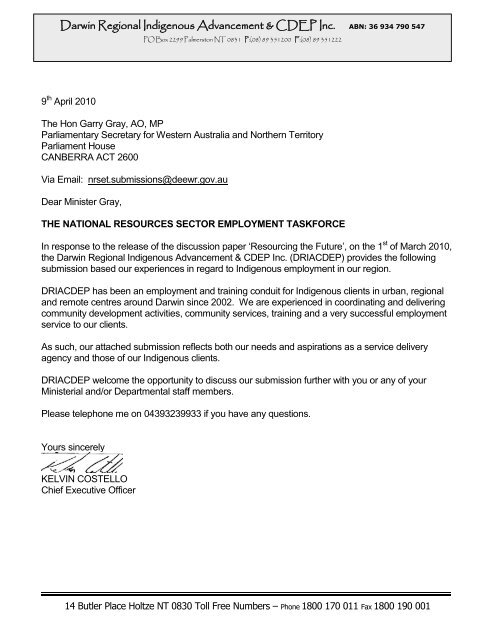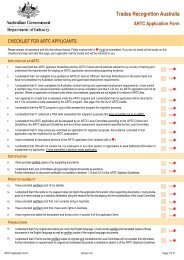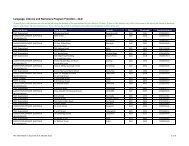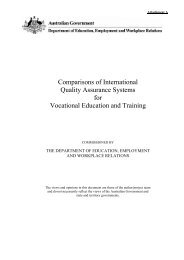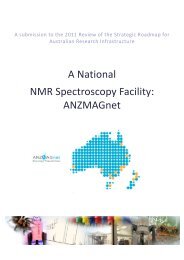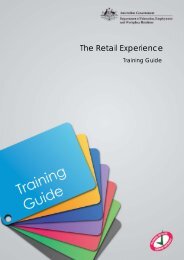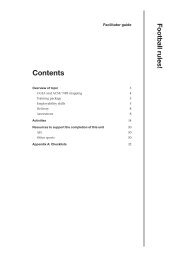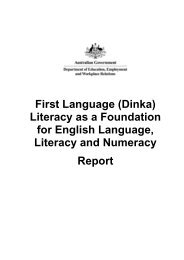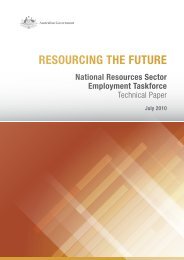Darwin Regional Indigenous Advancement & CDEP Inc. ABN: 36 ...
Darwin Regional Indigenous Advancement & CDEP Inc. ABN: 36 ...
Darwin Regional Indigenous Advancement & CDEP Inc. ABN: 36 ...
Create successful ePaper yourself
Turn your PDF publications into a flip-book with our unique Google optimized e-Paper software.
<strong>Darwin</strong> <strong>Regional</strong> <strong>Indigenous</strong> <strong>Advancement</strong> & <strong>CDEP</strong> <strong>Inc</strong>. <strong>ABN</strong>: <strong>36</strong> 934 790 547<br />
PO Box 2299 Palmerston NT 0831 P:(08) 89 351200 F:(08) 89 351222<br />
9 th April 2010<br />
The Hon Garry Gray, AO, MP<br />
Parliamentary Secretary for Western Australia and Northern Territory<br />
Parliament House<br />
CANBERRA ACT 2600<br />
Via Email: nrset.submissions@deewr.gov.au<br />
Dear Minister Gray,<br />
THE NATIONAL RESOURCES SECTOR EMPLOYMENT TASKFORCE<br />
In response to the release of the discussion paper ‘Resourcing the Future’, on the 1 st of March 2010,<br />
the <strong>Darwin</strong> <strong>Regional</strong> <strong>Indigenous</strong> <strong>Advancement</strong> & <strong>CDEP</strong> <strong>Inc</strong>. (DRIA<strong>CDEP</strong>) provides the following<br />
submission based our experiences in regard to <strong>Indigenous</strong> employment in our region.<br />
DRIA<strong>CDEP</strong> has been an employment and training conduit for <strong>Indigenous</strong> clients in urban, regional<br />
and remote centres around <strong>Darwin</strong> since 2002. We are experienced in coordinating and delivering<br />
community development activities, community services, training and a very successful employment<br />
service to our clients.<br />
As such, our attached submission reflects both our needs and aspirations as a service delivery<br />
agency and those of our <strong>Indigenous</strong> clients.<br />
DRIA<strong>CDEP</strong> welcome the opportunity to discuss our submission further with you or any of your<br />
Ministerial and/or Departmental staff members.<br />
Please telephone me on 04393239933 if you have any questions.<br />
Yours sincerely<br />
KELVIN COSTELLO<br />
Chief Executive Officer<br />
14 Butler Place Holtze NT 0830 Toll Free Numbers – Phone 1800 170 011 Fax 1800 190 001
1. Introduction<br />
Though physically based in <strong>Darwin</strong>, neither our service area nor our clientele fit a general<br />
description of ‘urban’. Our region covers the <strong>Darwin</strong> metropolitan area, including Aboriginal urban<br />
living areas and rural and remote <strong>Indigenous</strong> communities, such as Acacia Larrakia and Belyuen.<br />
This area region is demographically diverse, covering approximately 12,000 <strong>Indigenous</strong> people<br />
in communities and townships across an area of 10,620 square kilometres. Our clients, including<br />
many of those in <strong>Darwin</strong>, are highly disadvantaged in regard to work and life skills and, in some<br />
respects, are as culturally, socially and physically isolated as those <strong>Indigenous</strong> people living in more<br />
geographically remote communities.<br />
<strong>Darwin</strong> <strong>Regional</strong> <strong>Indigenous</strong> <strong>Advancement</strong> & <strong>CDEP</strong> <strong>Inc</strong>orporated (DRIA<strong>CDEP</strong>) was established<br />
in June 2002 following extensive consultations with the <strong>Indigenous</strong> community in the <strong>Darwin</strong><br />
region. From these discussions, a unique governance model was developed with representation<br />
and participation based on regional community organisations rather than individual members.<br />
These arrangements include special acknowledgement of the Larrakia people and the Stolen<br />
Generations within the constitution – in recognition of both traditional ownership of country and<br />
our recent history which saw many <strong>Indigenous</strong> children removed from their families and placed<br />
into institutions in <strong>Darwin</strong> and other communities.<br />
DRIA<strong>CDEP</strong> has grown markedly over the years, beginning with 50 participants (via the<br />
Aboriginal Development Foundation), and progressing to be a major service provider to the<br />
region for community and employment services. Until the Federal Government’s withdrawal of<br />
<strong>CDEP</strong> from urban areas in July 2007, and its decision to cease the program altogether by June<br />
2008, DRIA<strong>CDEP</strong> administered <strong>CDEP</strong> and an award-winning <strong>Indigenous</strong> Employment Centre.<br />
DRIA<strong>CDEP</strong> has delivered a suite of training, employment and enterprise development services to<br />
<strong>Indigenous</strong> job seekers in collaboration with a diverse cross-section of host employers and through<br />
structured professional development activities, community based activities, accredited and non<br />
accredited training, job placement, structured work experience and a tailored, highly personalised<br />
mentoring program.<br />
2. Current Services<br />
With the removal of ‘urban <strong>CDEP</strong>’ in June 2007, DRIA<strong>CDEP</strong> ‘lost’ 300 <strong>CDEP</strong> participants as a result<br />
of the previous Coalition Government philosophy on urban <strong>CDEP</strong>. As a result of this decision our<br />
very successful <strong>Indigenous</strong> Employment Centre (IEC) was also removed in this process. The<br />
<strong>Indigenous</strong> Employment Centre won a Prime Minister’s Community Business Partnership Award in<br />
2005 and had consistently exceeded the national average for both <strong>Indigenous</strong> employment<br />
outcomes and subsequent retention rates, translating into real outcomes with at least 100 <strong>CDEP</strong><br />
participants successfully transitioning to mainstream employment in 2006/2007.
Given the demographics of our region and the levels of disadvantage and disengagement affecting<br />
our <strong>CDEP</strong> participants and their communities, the removal of <strong>CDEP</strong> had a devastating impact on the<br />
resources of our organisation and a traumatic effect on the level of support available to our clients<br />
and their communities, especially those living in ‘town camps’ (Aboriginal Urban Living Areas).<br />
However, DRIA<strong>CDEP</strong> continue to service 124 <strong>CDEP</strong> participants for our 16 communities and<br />
members located in the rural/regional footprint surrounding <strong>Darwin</strong>.<br />
DRIA<strong>CDEP</strong> was also successful in being placed on Structured Training Employment Program –<br />
Employment Related Services (STEPERS) Panel and have previously operated 130 Placements<br />
under a STEPERS contract. DRIA<strong>CDEP</strong> has previously enjoyed a high rate of success in placing<br />
STEPERS clients into full time, non-subsidised, employment.<br />
In July 2009, DRIA<strong>CDEP</strong> commenced operation (under subcontracting arrangements with Job<br />
Futures Ltd.) Ironbark Employment, a Jobs Services Australia Provider.<br />
3. DRIA<strong>CDEP</strong> Service Delivery Model<br />
DRIA<strong>CDEP</strong> established and implemented its existing pre-employment model in 2002 as a proactive<br />
step to provide their existing <strong>CDEP</strong> participants with a highly targeted, relevant, culturally appropriate<br />
and supportive suite of pre-employment activities, programs and pathways.<br />
DRIA<strong>CDEP</strong> identified the need for a broad, flexible and very individualised approach to preemployment<br />
skills development, through feedback received from employers and <strong>Indigenous</strong><br />
jobseekers. Both parties felt they were not being effectively assisted with appropriate preemployment<br />
services from the existing Job Network Members (JNMs) in the region. Subsequently,<br />
the principles of DRIA<strong>CDEP</strong> current pre-employment model were established. The model was<br />
further developed and refined over time, through DRIA<strong>CDEP</strong>’s expertise in providing <strong>Indigenous</strong><br />
employment services in the highly cyclical and complex characteristics of the <strong>Darwin</strong> Employment<br />
Service Areas (ESA).<br />
The principles of DRIA<strong>CDEP</strong> pre-employment model are:<br />
<br />
<br />
Provide highly disadvantaged, unemployed <strong>Indigenous</strong> jobseekers with opportunities to<br />
meaningfully engage in activities and processes that will provide the greatest opportunity for<br />
employment (both short and long term) in the major industry sectors of the Northern Territory<br />
economy. These industries are predominately the service sector (retail, hospitality and tourism),<br />
government (territory and local councils), mining, building and construction (trades and<br />
labourers);<br />
Provide flexibility and responsiveness for both employers and jobseekers. The current model<br />
can address skills and labour shortages of a range of industry sectors and can equip suitable<br />
participants with skills quickly to meet peaks in the labour market. For example, DRIA<strong>CDEP</strong><br />
assisted 123 unemployed <strong>Indigenous</strong> jobseekers articulate into frontline roles in the construction<br />
industry, during the construction phase of the Bechtel LNG plant in <strong>Darwin</strong> over a 3 year period.
Allow for the delivery of different levels and types of training and facilitate flexible entry and exit<br />
points for individual jobseekers<br />
Generate efficiencies and cost savings by utilising the generic nature of some industry training at<br />
the entry level (e.g. OH&S, customer service, computer skills and drivers licensing).<br />
4. Specific comments in relation to the National Resources Sector Employment<br />
Taskforce (NRSET) – Terms Of Reference, in particular, Point 2 of the Terms Of<br />
Reference (‘Develop a plan that addresses labour and skill shortage issues in the<br />
resources sector’) dot point 3 (‘maximising employment and training opportunities for<br />
local communities, especially <strong>Indigenous</strong> people’):<br />
a) Major <strong>Indigenous</strong> Transitional Accommodation Facility For <strong>Indigenous</strong> Workforce For <strong>Darwin</strong><br />
In December 2009, the Northern Territory Chief Minister, The Honourable Paul Henderson (MLA)<br />
announced that the Northern Territory Government would assist in developing a Tradesman<br />
Accommodation Camp, to attract more Trade Qualified people to <strong>Darwin</strong>, for the proposed major<br />
infrastructure projects that will commence within an expected 12 – 18 month period. The<br />
announcement also reflected the lack of housing available within <strong>Darwin</strong> and Palmerston for<br />
qualified tradesman, and generally the lack of available, affordable accommodation.<br />
<strong>Indigenous</strong> NGO’s such as the DRIA<strong>CDEP</strong> have been lobbying both the NT Government & the<br />
Australian Government for a number of years to develop an <strong>Indigenous</strong> Caravan<br />
Park/Accommodation Facility that could accommodate <strong>Indigenous</strong> people who wish to participate in<br />
employment and improve the quality of their lives. Significantly the major barrier to sustainable<br />
employment opportunities for <strong>Indigenous</strong> people is having stable accommodation, during the first 3 -<br />
6 -12 months of employment.<br />
b) Local <strong>Indigenous</strong> Participation Plans/Australian Employment Covenant/ Reconciliation Action<br />
Plans/Local <strong>Indigenous</strong> Labor Hire Agency’s<br />
Recently Minister Lindsay Tanner (Minister For Finance & Deregulation) and Minister Mark Arbib<br />
(Minister For Employment Participation) made a joint media announcement that the Australian<br />
Government would require businesses that were interested in tendering for Australian Government<br />
contracts (worth more than $5 million dollars), would be required to provide plans for employment of<br />
local <strong>Indigenous</strong> people and plans to use <strong>Indigenous</strong> suppliers. (See attachment)<br />
Whilst this announcement is welcomed, Industry/Business generally do not access any ‘tools’ that<br />
could assist them in determining the best model to accommodate this requirement from the<br />
Australian Government.<br />
There exists potentially 4 ‘tools’ which Industry/Business could utilise:<br />
1. Local <strong>Indigenous</strong> Participation Plans
2. Australian Employment Covenant<br />
3. Reconciliation Australia – Reconciliation Action Plans<br />
4. Local <strong>Indigenous</strong> Labor Hire Agencies/Companies<br />
c) Contingent Liability On Proposed Financial Reports For Business/Industry Tendering For<br />
Australian Government & NT Government Tenders.<br />
The Northern Territory and the Australian Government’s should require all tenders ‘let’ in the<br />
Northern Territory to include a requirement for Industry/Business to include a ‘Contingent Liability’ on<br />
proposed financials lodged with all tender’s/submissions, this should include a ‘cashed out’ dollar<br />
value of all <strong>Indigenous</strong> positions that are being promised, as part of the tender/submission process.<br />
There is significant repetition around ‘loose promises’ made by Industry/Business (whilst tendering<br />
for Government Contracts/Tenders), that promise significant <strong>Indigenous</strong> employment opportunities,<br />
usually in the form of very attractive Local <strong>Indigenous</strong> Participation Plans’, or proposed internal<br />
Aboriginal Employment Strategies.<br />
Once a Tender/Contract has been awarded to a company, there is no responsibility by the NT or<br />
Australian Government to ensure that the promises made in the initial tender document proposed by<br />
the successful Company/Business, is honoured by that Company/Business. There are literally<br />
hundreds (possibility thousands) of examples of individual employment opportunities that are not<br />
honoured by Industry/Business, once a Contract/Tender has been won.<br />
The NT and Australian Government should consider establishing a requirement for the ‘cashed out’<br />
dollar value of each individual position, that Companies/Business’s claim they will create, if their<br />
respective Tender is approved. This needs to be clearly identified in the Tender/Submission. This<br />
‘cashed out dollar value’ should be scrutinised by the NT Department of Treasury, and a penalty<br />
applied to Companies/Business’s that do not honour their <strong>Indigenous</strong> Participation Plans/Aboriginal<br />
Employment Strategies.<br />
This penalty should be paid into a fund that allows for innovative training to employment projects to<br />
be developed by NGO’s. There needs to be more than ‘best endeavours’ that Industry/Business has<br />
offered over the last 20 years.<br />
d) Cross Cultural Courses – Charles <strong>Darwin</strong> University<br />
The Charles <strong>Darwin</strong> University delivers a world class ‘Cross Cultural Education’ course to<br />
Government/Industry/Business. This course also provides a strong focus on the ‘Larrakia’<br />
perspective.<br />
All prospective employers in the <strong>Darwin</strong>/Palmerston region should consider accessing the Cross<br />
Cultural Course, both for its quality and also for the cultural significance that the course is delivered<br />
by a senior lecturer who is a Larrakia man.
e) <strong>CDEP</strong> <strong>Regional</strong> Mobility Coordination Trial<br />
DRIA<strong>CDEP</strong> has recently been supported by FaHCSIA to trial a pilot, ‘<strong>Regional</strong> Mobility Coordination<br />
Project’, that will focus on encouraging up to 60 regional, remote <strong>CDEP</strong> participants, travelling into<br />
<strong>Darwin</strong> for training and employment.<br />
This pilot project will see the DRIA<strong>CDEP</strong> working closely with 8 <strong>CDEP</strong> Service Providers from the<br />
FaHCSIA – <strong>Darwin</strong> <strong>Indigenous</strong> Coordination Centre (Wadeye/Tiwi Islands/Manigrida) The project<br />
will facilitate and encourage improved coordination of training for <strong>CDEP</strong> participants in<br />
regional/remote communities. It will also provide the opportunity to encourage <strong>CDEP</strong> participants to<br />
travel into <strong>Darwin</strong> with supported accommodation and assistance from the DRIA<strong>CDEP</strong> and also to<br />
ensure that <strong>CDEP</strong> participants who travel to <strong>Darwin</strong> are provided with necessary practical support<br />
(transport, mentoring, etc) whilst they are in <strong>Darwin</strong>.


